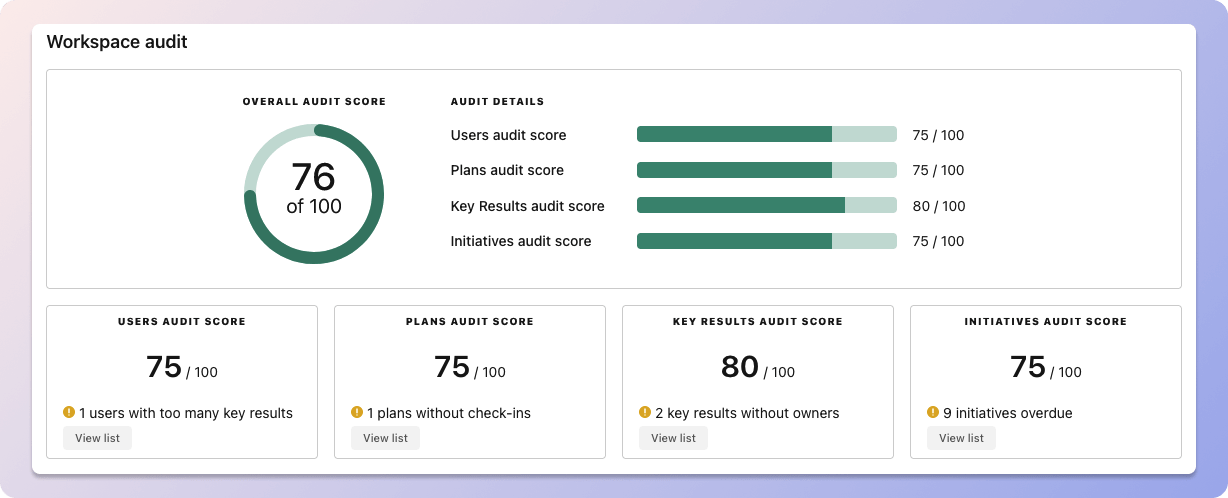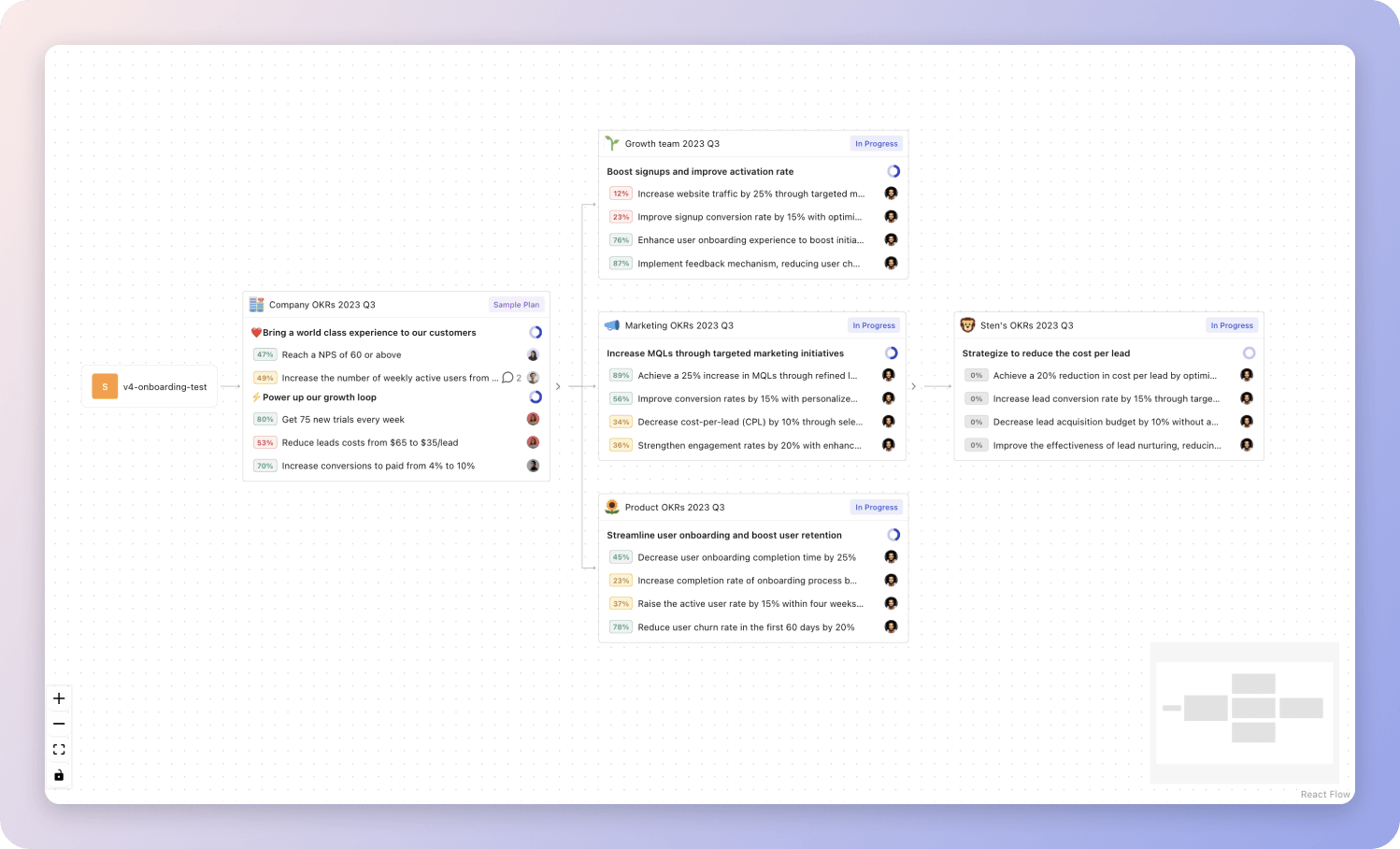2 OKR examples for Policy Analyst
What are Policy Analyst OKRs?
The Objective and Key Results (OKR) framework is a simple goal-setting methodology that was introduced at Intel by Andy Grove in the 70s. It became popular after John Doerr introduced it to Google in the 90s, and it's now used by teams of all sizes to set and track ambitious goals at scale.
OKRs are quickly gaining popularity as a goal-setting framework. But, it's not always easy to know how to write your goals, especially if it's your first time using OKRs.
We've tailored a list of OKRs examples for Policy Analyst to help you. You can look at any of the templates below to get some inspiration for your own goals.
If you want to learn more about the framework, you can read more about the OKR meaning online.
Best practices for managing your Policy Analyst OKRs
Generally speaking, your objectives should be ambitious yet achievable, and your key results should be measurable and time-bound (using the SMART framework can be helpful). It is also recommended to list strategic initiatives under your key results, as it'll help you avoid the common mistake of listing projects in your KRs.
Here are a couple of best practices extracted from our OKR implementation guide 👇
Tip #1: Limit the number of key results
Focus can only be achieve by limiting the number of competing priorities. It is crucial that you take the time to identify where you need to move the needle, and avoid adding business-as-usual activities to your OKRs.
We recommend having 3-4 objectives, and 3-4 key results per objective. A platform like Tability can run audits on your data to help you identify the plans that have too many goals.
 Tability's audit dashboard will highlight opportunities to improve OKRs
Tability's audit dashboard will highlight opportunities to improve OKRsTip #2: Commit to the weekly check-ins
Having good goals is only half the effort. You'll get significant more value from your OKRs if you commit to a weekly check-in process.
Being able to see trends for your key results will also keep yourself honest.
 Tability's check-ins will save you hours and increase transparency
Tability's check-ins will save you hours and increase transparencyTip #3: No more than 2 yellow statuses in a row
Yes, this is another tip for goal-tracking instead of goal-setting (but you'll get plenty of OKR examples below). But, once you have your goals defined, it will be your ability to keep the right sense of urgency that will make the difference.
As a rule of thumb, it's best to avoid having more than 2 yellow/at risk statuses in a row.
Make a call on the 3rd update. You should be either back on track, or off track. This sounds harsh but it's the best way to signal risks early enough to fix things.
Building your own Policy Analyst OKRs with AI
While we have some examples below, it's likely that you'll have specific scenarios that aren't covered here. There are 2 options available to you.
- Use our free OKRs generator
- Use Tability, a complete platform to set and track OKRs and initiatives
- including a GPT-4 powered goal generator
Best way to track your Policy Analyst OKRs
Quarterly OKRs should have weekly updates to get all the benefits from the framework. Reviewing progress periodically has several advantages:
- It brings the goals back to the top of the mind
- It will highlight poorly set OKRs
- It will surface execution risks
- It improves transparency and accountability
Most teams should start with a spreadsheet if they're using OKRs for the first time. Then, once you get comfortable you can graduate to a proper OKRs-tracking tool.
 Tability's Strategy Map makes it easy to see all your org's OKRs
Tability's Strategy Map makes it easy to see all your org's OKRsIf you're not yet set on a tool, you can check out the 5 best OKR tracking templates guide to find the best way to monitor progress during the quarter.
Policy Analyst OKRs templates
We've covered most of the things that you need to know about setting good OKRs and tracking them effectively. It's now time to give you a series of templates that you can use for inspiration!
You'll find below a list of Objectives and Key Results templates for Policy Analyst. We also included strategic projects for each template to make it easier to understand the difference between key results and projects.
Hope you'll find this helpful!
OKRs to enhance policy analysis acumen for agriculture and nature concerns
Enhance policy analysis acumen for agriculture and nature concerns
Initiate and lead two workshops focusing on nature and agriculture policy discussions
Plan detailed itineraries for both workshops
Select two topics of interest in nature and agriculture policies
Invite knowledgeable speakers and inform participants
Analyze and write reviews on 10 different existing policies affecting agriculture and nature
Write comprehensive reviews for each policy
Analyze chosen policies’ impact on agriculture and nature
Select 10 agriculture/nature-related policies for review
Complete four relevant rigorous courses on policy analysis by quarter-end
Enroll in the chosen policy analysis courses
Identify four relevant courses on policy analysis
Complete, engage, and pass all courses
OKRs to determine leading causes for policy non-renewals
Determine leading causes for policy non-renewals
Analyze data from non-renewals and categorize common reasons by week 6
Analyze the gathered data and categorize reasons
Collect all data related to non-renewals before week 6
Document findings for each common reason weekly
Submit a detailed report outlining top 3 reasons by week 8
Analyze data to identify top 3 reasons
Create a detailed outline of findings
Submit the report by week 8
Conduct a survey from 100 non-renewing customers for detailed feedback by week 4
Distribute survey amidst chosen customers by week 4
Create a detailed feedback survey
Identify 100 non-renewing customers for the survey
More Policy Analyst OKR templates
We have more templates to help you draft your team goals and OKRs.
OKRs to boost employee awareness and risk perception
OKRs to secure 6.5M for nonprofit
OKRs to improve relationships and delivery results with internet customers and project managers
OKRs to contribute proactively to three Atlassian Services proposals
OKRs to achieve record profitability
OKRs to develop and strengthen effective team leadership skills
OKRs resources
Here are a list of resources to help you adopt the Objectives and Key Results framework.
- To learn: Complete 2024 OKR cheat sheet
- Blog posts: ODT Blog
- Success metrics: KPIs examples